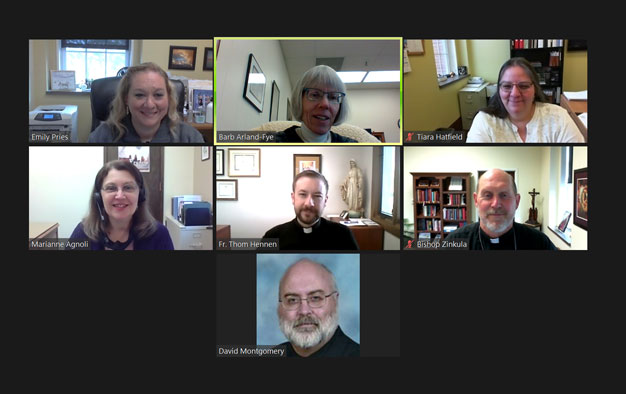
Members of the Gender Committee for the Diocese of Davenport include Bishop Thomas Zinkula, Father Thom Hennen, Deacon David Montgomery, Marianne Agnoli, Tiara Hatfield, Emily Pries and Lynne Devaney (not pictured).
By Barb Arland-Fye
The Catholic Messenger
(Editor’s Note: This is the first article in a series on A Pastoral Approach to Gender.)
Questions regarding youths and adults who identify as transgender continue to arise in society and the Church. Acknowledging that reality, Bishop Thomas Zinkula formed a committee 10 months ago to consider drafting a policy to help guide Catholic schools, parishes and others in their interactions with transgender persons and their families. “We need to approach this issue with humility,” the bishop said.
The Gender Committee members set out to learn more about gender issues, specifically related to transgenderism. They have studied the terminology, latest research, networked with others in the Church on the forefront of this ministry and listened to stories of transgender persons and their families. Each committee meeting begins and ends in prayer.
“The more we talked about it and met with people who are transgender or whose loved ones are transgender, we came to understand them a little better and how they were feeling. It was very humanizing. Our approach to this issue has evolved. We’re probably leaning toward developing a statement rather than a policy,” said Father Thom Hennen, a Gender Committee member who also serves as the diocese’s vicar general and pastor of Sacred Heart Cathedral in Davenport.
His work with Courage, a ministry for Catholics who experience same-sex attraction, convinced him to approach Bishop Zinkula and the diocese’s Marriage and Family Life Coordinator Marianne Agnoli about the need to discuss the transgender issue. Same-sex attraction and transgenderism are separate issues but both require appropriate balance in applying Church teaching and pastoral care, the bishop said. “Starting this conversation is important. Providing basic information to the people of our diocese is a first step.”
God’s plan
Church teaching does not specifically address transgenderism. However, efforts in the culture to codify gender equality, protection against discrimination and public funding of gender-related surgery and treatment have compelled Church leaders to examine the signs of the times within the context of Church teaching on human sexuality in general. In 2019, the Vatican’s Congregation for Catholic Education issued a document titled “Male and Female He Created Them, Towards a Path of Dialogue on the Question of Gender Theory in Education.” “This document was met with mixed support among Catholic institutions,” Agnoli said.
The introduction includes this excerpt: “In fact, it is from [their] sex that the human person receives the characteristics which, on the biological, psychological and spiritual levels, make that person a man or a woman, and thereby largely condition his or her progress towards maturity and insertion into society.”
As each person grows, “such diversity, linked to the complementarity of the two sexes, allows a thorough response to the design of God according to the vocation to which each one is called” (No. 4).
The concluding paragraphs of “Male and Female” include this guidance: “Every school should therefore make sure it is an environment of trust, calmness and openness, particularly where there are cases that require time and careful discernment. It is essential that the right conditions are created to provide a patient and understanding ear, far removed from any unjust discrimination” (No. 56). “The committee was in support of such a recommendation but felt the document failed to provide practical procedures that demonstrate a full understanding of the complexities of accompanying transgender children and their families,” Agnoli said.
Growing awareness
“Transgenderism is a complex reality about which no one individual, organization or institution possesses complete wisdom,” Agnoli said. In its draft statement, the Gender Committee notes, “Persons who identify as transgender or gender non-conforming are our children, siblings, parishioners, neighbors and friends. They do not experience the same deep psychological and physiological association between sex and gender that most men and women experience. While this is not a new phenomenon, our greater awareness of it is new.”
Persons who identify as transgender represent a very small percentage of the U.S. population, about .6% to .7%, according to the Williams Institute at UCLA School of Law. The institute states that federal and state population studies from 2016 estimate that 1.4 million to 1.65 million U.S. adults identify as transgender. Among high school students, an average of 1.8% identified as transgender, according to population-based survey data from 10 states and nine urban school districts, the Centers for Disease Control and Prevention (CDC) reported in 2019 (https://tinyurl.com/ 3b3knd7x). “It’s important to remember that for those who authentically experience this — however few people that may be relative to the general population — it is not something they choose. This idea that transgender people just out of the blue decide they want to be a different gender is mistaken,” Father Hennen said.
How the church can best accompany and minister to transgender persons is at the center of the committee’s discernment. “Somehow we have to figure out how to reconcile our theology, specifically our Christian anthropology, including the idea that we are body and soul, with how we approach these issues pastorally,” Father Hennen continued. “Yes, we are more than our bodies, but at the same time our bodies are really important. They are not just ‘containers.’ Our Catholic sacramental theology gets this. The body is how we interact with the world. We worship with the body, we show reverence for the body, even after death, and we look forward to a bodily resurrection.”
“How do we account for such things as the correspondence between sex and gender — which most people experience — the complementarity of the sexes and the fruitfulness of the union of man and woman?” Father Hennen asked. “How do we acknowledge those ideas, revealed in the ‘Theology of the Body,’ while at the same time acknowledging the presence, the dignity, the full humanity and, therefore, the need for authentic pastoral care for all people, regardless of sex or gender? The same language used by the Catechism in regard to homosexual persons can certainly be applied here, namely, our transgender siblings should be treated with respect, compassion and sensitivity.”
Catholics’ approach to transgender persons should be “both/and,” not “either/or,” Father Hennen said. “This notion that we have to choose either to be faithful to our Catholic teaching on the nature of the human person or welcome, love, and accompany transgender persons is really a false choice. In fact, it is precisely our understanding of the dignity of the human person that should motivate our love for transgender persons. Are there some appropriate accommodations that we could make as a Church that neither ‘sell out’ on our beliefs nor slam the door in the face of transgender persons? I think there may be. That’s what we have to explore.”
Coming ahead
The Catholic Messenger will continue to provide articles that educate and inform readers about transgenderism and gender-related issues in future issues and provide updates on the work of the Diocese of Davenport Gender Committee.












Gender Committee
Thank you for studying & addressing the Churches approach to genders. All of God’s children should be loved & appreciated for who they are.
I read this & Part 3, but missed Part 2 of the Pastoral Approach to gender series. Please tell me the title of Part 2, so I can read it online. Thank you@
Thank you.
Here are the links to the three articles published in The Catholic Messenger.
http://www.catholicmessenger.net/2022/01/the-church-calls-us-to-listen-to-people-on-the-margins/
http://www.catholicmessenger.net/2021/12/a-deacon-familys-journey-with-transgenderism/
http://www.catholicmessenger.net/2021/11/reflecting-carefully-on-the-issue-of-gender/
It’s fantastic to see the Bishop reaching out to the transgender community. I am transgender in Ohio and I appreciate Bishop Thomas’s understanding and compassion to us.
I was shocked by the Michigan parish seeing transgender people as non Christian. Have they withdrew their stance in refusing transgender folks.
Sherriea
“A Pastoral Approach to Gender” in Davenport’s diocesan newspaper, the Catholic Messenger,